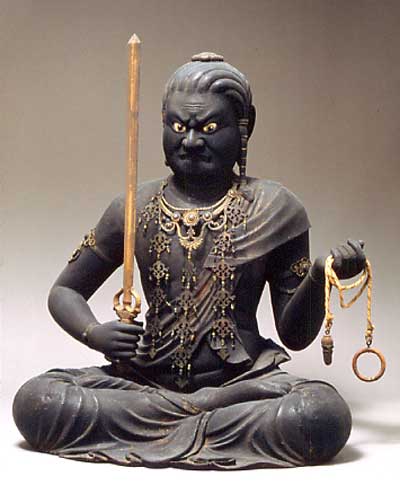“Shiranu ga hotoke”
(“Not knowing is Buddha.”)
Once upon a time, during the 1970’s, professor Ellen Langer of Harvard University conducted a couple of truly brilliant scientific studies on the human mind.
These studies, which carried on for several years, went under such cool topics as ‘the illusion of control’, ‘decision making’, ‘aging’ and ‘mindfulness’ – to name a few. And, while most of these studies were pretty fascinating in general, there is one study in particular that I want to share with you today.
One that I think will have a surprising impact on your view of Karate knowledge and its process of transmission.
In this particular study, prof. Langer conspired with the university librarian to shut down all of the photocopy machines in an exceptionally busy wing of the Harvard library… except one.
Obviously, this quickly resulted in a long line behind the single working photocopy machine.

Perfect.
Because now, over the course of several days, Langer had assistants approach the person at the front of the line with a simple request to “cut” in line.
The assistant’s request was carefully worded in different ways:
- In the first condition, the assistant said; “Excuse me, may I use the Xerox machine, because I’m late to class?”. This question (request plus reason), resulted in a 94% compliance rate. In other words, if you gave a sensible reason for cutting in line, 94% of the people would let you. Pretty neat.
- In the second condition, the assistant asked, “Excuse me, may I use the Xerox machine?”. The structure of this question, a simple request followed by no supporting reason, resulted in a much lower compliance rate of only 60%.
No surprise, right?
Great.
So, let’s leave that study for a second, and let me get to the real point of this post:
Are you a black belt holder?
Or perhaps even a Karate teacher (sensei)?!
Well, then you’re probably aware that people will inevitably ask you a lot of questions during Karate class.
As an advanced Karate student (or sensei), the immeasurable honor of being an unlimited source of divine, all-encompassing, Karate wisdom seems to be on top of our job description. But, although students’ questions can range from perfectly normal ones (“What is the meaning behind this move?”) to the more obscure ones (“How do I harden my nuts?”), the one thing every question has in common is the need for an answer.
And that answer, my dear friend, has to be  provided by you.
provided by you.
Why?
Because, well, you’re… you’re wearing a ragged black belt right?!
So, automatically, knowledge-hungry Karate-ka of lower levels will always look up to you in search for divine Karate wisdom.
My question, then, is:
Are you ready for this role? Do you really know everything there is to possibly know about Karate? The history? The techniques? The culture? The styles? The katas? The masters? The terminology? The minutiae?
Well…
Whatever you’re about to tell me, hold that thought.
Because I’m here to tell you that it doesn’t matter.
That’s right.
It.
Doesn’t.
Matter.
In order to assume the role of black belt fountain of wisdom, whether intentionally or not, you really don’t have to know as much as you think you do. That’s what the surprising last part of professor Langers fascinating study at Harvard University tells us… which I am about to reveal right now.
You see, in order to demonstrate the truly irrational manner in which most people operate, the professor added a third form of the request to her assistant’s repertoire:
- “Excuse me, may I use the Xerox machine, because I have to make some copies?”
Uh…what?
That’s right.
“…because I have to make some copies.”
What kind of dumb reason is that?! Why else would a person be at the copy machine if it weren’t to make copies?
Well, stupid or not, here’s the truly mind-blowing part: This bogus request actually matches the pattern of a legitimate request! In this condition, the assistant gained compliance 93% of the time, (just 1% less than with the legitimate request.)
Let me rephrase that:
Giving people an straight answer, or a reason, no matter if it’s actually sensible or not (purely in order to satisfy curiosity/anxiety) is almost as important as WHAT that answer or reason is!
And that, dear reader, is why I sometimes lie to my students.
And you should too.
Now, listen: Misunderstand me right here. I’m not saying you should run around and lie to people. Of course not. That’s immoral and immature. I’m just suggesting that if somebody asks you WHY, it is far better to give them SOME REASON (even if you’re not sure it’s 100% correct), than to provide them with NO REASON.
Get what I’m saying?
I do this all the time.
In 9 times out of 10, if I don’t know the answer to a certain question, I will seriously make something up on the spot.
I won’t even blink.
Of course, I’ll go and look up the real answer as fast as I possibly can – if it is important. Always. I’m not an ignoramus, I love learning as much as you do. Then, if the truth deviates significantly from my answer, I’ll come straight back to you, saying: “Sorry buddy, I was wrong. I looked it up and here’s the real answer.”
Because here’s the thing you need to know:
As a Karate teacher, most questions you get aren’t really questions.
Far from it.
They’re “questions” (air quotes).
Although they are disguised as questions, they’re actually “questions” – coming from people deliberatey seeking attention or confirmation. And, as such, providing an unnecessary and elaborate accurate answer (rather than providing a positive and satisfactory “answer”) could even be regarded as a sign of weakness on the part of the instructor; who now falls in the trap of showing off his ego rather than using his time and knowledge on things that truly matter.
 So…
So…
Is this the best approach for you, as a black belt holder in Karate?
As a sensei?
As someone who gets asked questions now and then?
- Geez, I don’t know…
- But…
- For me it is.
- And science backs it up, baby.
In my humble opinion, the immediate satisfaction and relief I provide by giving somebody a neat “answer” on the spot (even if I know it’s not totally correct) far outweighs the possible benefits of not giving an incorrect answer at all.
Which is why I think any sensei worth his salt should not be afraid to occasionally lie to his students.
Because ignorance is bliss.
“Shiranu ga hotoke”
(“Not knowing is Buddha.”)



27 Comments